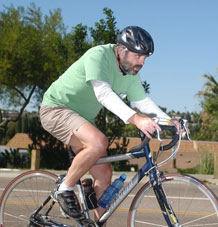

Finding Flow
By Mika Ono
What can make you happy? Fortunately, there's a long list, including gratitude, optimism, living in the moment, savoring life's pleasures, healthy relationships, and meaningful work... Among these gems is what one psychologist has called "flow," the topic of a recent talk that was part of The Scripps Research Institute's Lunch & Learn seminar series for employees.
"Flow is being in the zone," said psychologist Steve Sprinkle, director of the counseling office at the University of San Diego, who gave the seminar at the institute's California campus on November 5. "It's a state of total involvement in an activity that requires complete concentration."
Sprinkle explained that Mihaly Csikszentmihalyi, a professor at Claremont Graduate School, coined the term "flow" as the result of some research he conducted. In the study, Csikszentmihalyi gave study participants pagers to carry with them for a week. Every time the pager went off, the participants wrote down what they were doing and how they felt about it.
When Csikszentmihalyi analyzed the data, he found some interesting patterns emerge. Contentment was particularly high when people were engaged in activities that shared certain characteristics. These "flow" activities:
- Had a goal
- Required concentration
- Induced a lack of self-consciousness
- Altered the participant's sense of time
- Offered immediate feedback
- Struck a balance between ease and challenge
- Gave the participant control
- Offered some intrinsic reward
- Resulted in the participant's absorption in the task
In the workshop, audience members offered examples of "flow" activities from their own lives. These included playing music, rock climbing, painting, bicycling, writing, acting, sewing, and line dancing. However, almost anything can become a flow activity with the right mindset, Sprinkle noted, and one audience member described how, for her, brushing her teeth was an act with flow-like qualities.
Can there be too much flow? Sprinkle thinks so. Life can become one-dimensional, and you risk putting "all your eggs in one basket." Also, Sprinkle cautioned, you need to be mindful about the effects of your flow activity on others. Just because you love talking about the Civil War 24/7 doesn't mean that everyone else wants to listen.
The goal, Sprinkle concluded, isn't to be in a state of flow 24 hours a day, but to try to make flow a regular part of your life. If you are looking for ways to increase your happiness, one method is to challenge yourself to make an existing activity more flow-like. Another alternative is to do something new—learn a new language or take up the piano, for example—that provides the opportunity to experience flow.
"Flow is not a cure-all," Sprinkle said. "It doesn't fix everything. However, life is poorer with no flow."
For more information on flow, see Csikszentmihalyi's Flow: The Psychology of Optimal Experience (Harper, 2008) or Finding Flow: The Psychology of Engagement with Everyday Life (Basic Books, 1998).
Send comments to: mikaono[at]scripps.edu

Psychologist Steve Sprinkle, director of the counseling office at the University of San Diego, finds flow through bicycling.
